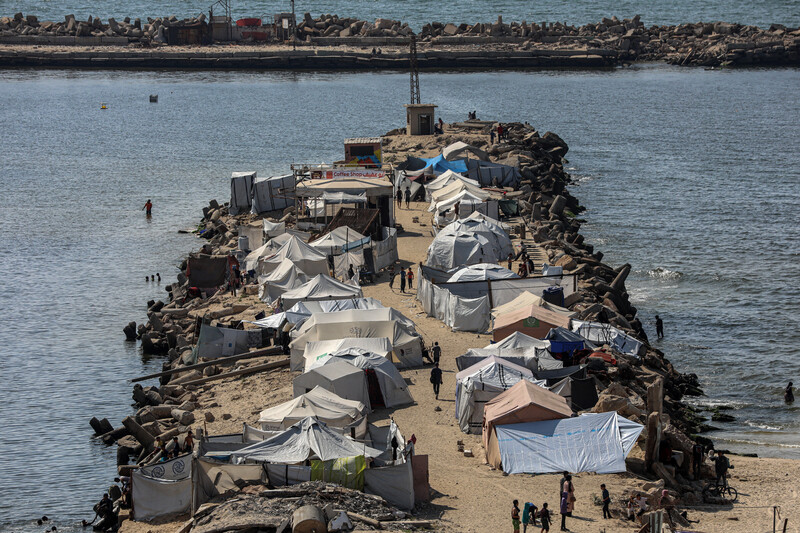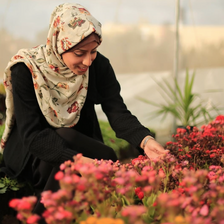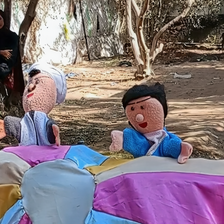The Electronic Intifada 10 July 2025

Displaced Palestinians have sought refuge at Gaza’s port, 8 June 2025, in Gaza City.
APA imagesThe port of Gaza, west of Gaza City, was once a beautiful place. Many residents would flock to the port daily and nightly to look at the boats, gather with family or take a stroll. It was also a hub for fishermen and other trades.
This is why its recent transformation this past May into a displacement zone, where thousands have sought basic refuge, is a shock to see. Memories of a once pleasant spot are now being obscured by the current reality of fear, hunger and poverty.
Muhammad Hamouda, 45, from Beit Lahiya in northern Gaza, has set up a tent with his wife and seven children.
“The Israeli occupation forces dispersed leaflets urging people to evacuate Beit Lahiya, and we were worried about where to go,” he said on 18 June, explaining that they took refuge at the port because no residential buildings were available to stay in.
“After evacuating all the areas one by one, the [area] became crowded and people were crowded together,” Hamouda said.
The port is now full of tents, with no paths separating the tents, he said. There is limited drinking water available at the port, Hamouda said, and his family must rely on water provided by aid organizations.
Despite the dire conditions at the port, people were still arriving after evacuating from the north because they had nowhere else to go.
Over 680,000 people in Gaza have been newly displaced since March 2025, according to the United Nations. “Less than 18 percent of Gaza remains outside of Israeli-militarized zones or displacement orders,” the UN reports.
Due to the mass displacements caused by the expansion of evacuation areas, and the lack of space free from rubble on which to set up camps, people are living wherever they can find space to pitch a tent. This has meant setting up tents in locations they would have previously considered uninhabitable, like the port.
Hamouda has been forced to evacuate various shelters and homes due to Israeli attacks, and he is afraid it will happen yet again.
“Our greatest fear is being evacuated from the Gaza port to another location, because movement and displacement are difficult due to the lack of adequate or safe space for the displaced.”
“I fled on foot three weeks ago”
At the port on 18 June, one could feel a sense of depression and hopelessness among those displaced here. Every day, those living in tents wait for news of a ceasefire so they can simply access adequate amounts of food to feed their children.
Women at the port are facing the most strenuous conditions.
Siniora al-Radhi, 60, from Beit Lahiya, was displaced to the port with her children and grandchildren, 14 people total. They are staying inside a single tent.
“I fled on foot three weeks ago, not knowing where I could go,” she said. “I followed the people and walked with them until I found myself at the Gaza port.”
She described the port as “not suitable” for living.
“We used to come here before the war to improve our well-being, to see the fishermen and the sea, but the war has deprived us of everything,” she said.
Her husband and several other family members were killed during Israeli strikes in Beit Lahiya. Several of her daughters have also lost their husbands and are now widows.
Despite all the loss and suffering, she said that “the most difficult feeling we experience is hunger.”
“Our children are starving, asking for bread and food. We only have lentils, and sometimes we don’t find any, and we’re forced to go to bed hungry,” she said.
She said that the port now resembles Beit Lahiya, “because all the displaced people here are from Beit Lahiya.”
She described her living situation as incredibly precarious.
“We live in a state of chaos due to the lack of security and the constant bombing,” she said. When there are Israeli air strikes near the port, she said she feels helpless. She does not have anywhere to run or hide from the bombs.
“This piece of cloth won’t protect us from the missiles.”
“Most difficult conditions of our lives”
Muhammad Rajab al-Masry, 37, was also displaced from Beit Lahiya to the port.
In May, his mother was killed when the Israeli army bombed their home without warning. He had to leave his mother under the rubble and flee to another house in his neighborhood with his cousin.
Al-Masry was injured during the initial bombing of his home, and when it came time to evacuate, he felt compelled to go south, where his wife and three children had already evacuated.
“I didn’t want to leave my area, but the army began targeting homes in a random and terrifying manner,” he said. “They bombed the house my cousin and I were in as soon as I left it.”
He fled on foot to the port and found his wife and three children.
“I used to love the port,” he said, “but I no longer leave my tent to see the sea. I feel very sad about this place. I wake up dozens of times during the night to check on my children, whether they are alive or not.”
He described these days as “the most difficult conditions of our lives.”
“Is it reasonable that I am by the sea and don’t like seeing it because I am uncomfortable? My mother was martyred, and then my brothers and I were separated because our mother is the reason we are together.”
Everyone feels rootless and that they are likely to be displaced again at any moment. They have lost the places that meant the most to them in their lives.
“My message to the world is to view Gaza from a humanitarian perspective and pressure Israel to allow food to enter for civilians,” said Muhammad Hamouda.
Ruwaida Amer is a journalist in Gaza.





